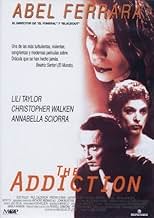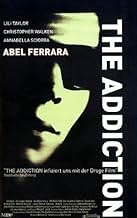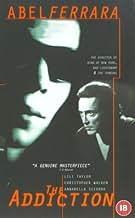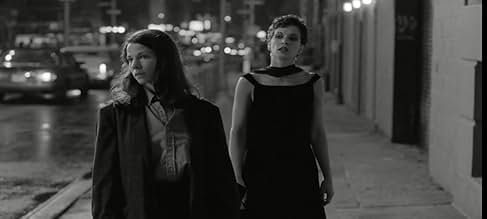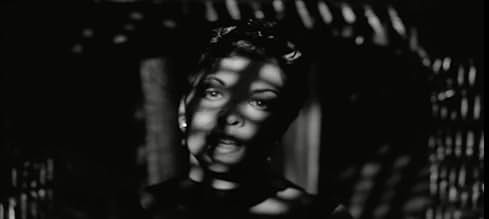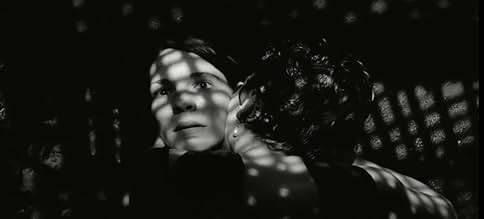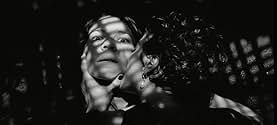PUNTUACIÓN EN IMDb
6,4/10
12 mil
TU PUNTUACIÓN
Una estudiante de posgrado en filosofía de Nueva York se convierte en vampiro después de ser mordida por uno, y luego trata de aceptar su nuevo estilo de vida y su frecuente deseo de sangre ... Leer todoUna estudiante de posgrado en filosofía de Nueva York se convierte en vampiro después de ser mordida por uno, y luego trata de aceptar su nuevo estilo de vida y su frecuente deseo de sangre humana.Una estudiante de posgrado en filosofía de Nueva York se convierte en vampiro después de ser mordida por uno, y luego trata de aceptar su nuevo estilo de vida y su frecuente deseo de sangre humana.
- Dirección
- Guión
- Reparto principal
- Premios
- 5 premios y 4 nominaciones en total
Jamal Simmons
- Black's Friend
- (as Jamel 'RedRum' Simmons)
Robert W. Castle
- Narrator
- (as Father Robert Castle)
- …
Michael A. Fella
- Cop
- (as Michael Fella)
Louis Katz
- Doctor
- (as Dr. Louis A. Katz)
Frank Aquilino
- Delivery Man
- (as Frank 'Butchy the Hat' Aquilino)
Nicholas De Cegli
- Cabby
- (as Nicholas Decegli)
Reseñas destacadas
'The Addiction' is one of the most original vampire movies ever made. In fact, I can't think of another one quite like it. Abel Ferrara has made some strange and disturbing movies in his time, and this one is as strange and disturbing as any. Lili Taylor ('I Shot Andy Warhol') is brilliant as a troubled, soul searching philosophy student who has an unexpected and life-changing encounter with a mysterious stranger ('Cop Land's Annabella Sciorra). Dark, deep, sometimes blackly humorous, and frequently too obscure for its own good, this can be heavy going at times, but is never less than interesting. Christopher Walken, who did some superb work for Ferrara in his classic 'The King Of New York', has only a cameo here, but what a cameo! Walken is terrific and unforgettable. The rest of the supporting cast includes 'The Sopranos' Edie Falco and (briefly) Michael Imperioli, Paul Calderon ('Girlfight'), and Kathryn Erbe ('Stir Of Echoes'). This is a unique movie that will be appreciated by those with an open mind and preference for "difficult" viewing. Recommended.
After a freak attack on a city street by a strange woman, a philosophy student develops a hunger for human blood ...
This starts out right in the audience's face, with footage of a US army massacre in Vietnam, leading to counter-balanced reactions between the protagonist and her friend - but which don't seem connected to the title of the movie. Then straight on to the attack, which is done with style and does connect directly ... in to the thematic jugular, so to speak.
So we're set up for a reflection on the strange phenomenon of addiction, right? Well, through a jumble of philosophical aphorisms and paradoxes casually tossed out through dialogue the movie shifts to an exploration of the will to power, then to original sin, and ends with an off-the-shelf rite of religious redemption. But even if the line of inquiry were clear - say, by just settling on Nietzsche's version - none of this philosophy is brought to life on the screen. I couldn't find it in the structure of the story, or the dilemmas faced by the heroine, or in the cinematography or music (although I did appreciate being introduced to Eine Sylvesternacht).
The performances are mostly casual, with the protagonist going through a crude flip in personality before ripping off her clothes in a frenzy. Thankfully there is Christopher Walken, who provides the only real bite as a mannered, pitiless vampire - in the context of the climax, really a fallen angel.
The cinematography is mostly bland, the flat B&W shoved in as a gimmick with little thought for light and shadow. There are several episodes where footage of massacres is just plonked on the screen - contrast that with the emotion in the record of human violence as presented to Leeloo in The Fifth Element, when we see the reaction in her face. That's how to do it in a movie. On the other hand, the seedy energy of the streets is well captured, and the pace is OK.
What the film-maker sets up is the depravity of humankind, but solely for the purpose of ramming home his preferred brand of salvation. Not at all philosophical - just an exercise in scolding the audience for the sake of his own justification. So that would be a sermon, then.
Overall: Quite a mess. Amen.
This starts out right in the audience's face, with footage of a US army massacre in Vietnam, leading to counter-balanced reactions between the protagonist and her friend - but which don't seem connected to the title of the movie. Then straight on to the attack, which is done with style and does connect directly ... in to the thematic jugular, so to speak.
So we're set up for a reflection on the strange phenomenon of addiction, right? Well, through a jumble of philosophical aphorisms and paradoxes casually tossed out through dialogue the movie shifts to an exploration of the will to power, then to original sin, and ends with an off-the-shelf rite of religious redemption. But even if the line of inquiry were clear - say, by just settling on Nietzsche's version - none of this philosophy is brought to life on the screen. I couldn't find it in the structure of the story, or the dilemmas faced by the heroine, or in the cinematography or music (although I did appreciate being introduced to Eine Sylvesternacht).
The performances are mostly casual, with the protagonist going through a crude flip in personality before ripping off her clothes in a frenzy. Thankfully there is Christopher Walken, who provides the only real bite as a mannered, pitiless vampire - in the context of the climax, really a fallen angel.
The cinematography is mostly bland, the flat B&W shoved in as a gimmick with little thought for light and shadow. There are several episodes where footage of massacres is just plonked on the screen - contrast that with the emotion in the record of human violence as presented to Leeloo in The Fifth Element, when we see the reaction in her face. That's how to do it in a movie. On the other hand, the seedy energy of the streets is well captured, and the pace is OK.
What the film-maker sets up is the depravity of humankind, but solely for the purpose of ramming home his preferred brand of salvation. Not at all philosophical - just an exercise in scolding the audience for the sake of his own justification. So that would be a sermon, then.
Overall: Quite a mess. Amen.
Abel Ferrara's moody, allegorical vampire tale makes fascinating and pointed statements on sin and redemption, spirituality and the nature of good (there's precious little of it) and evil (no one is safe from it). And unfortunately, but not surprisingly, it was relatively ignored in America.
Lili Taylor gives a brooding, glib and haunting central performance as Kathleen Conklin, a New York University grad student who is pulled into an alley and bitten by a seductive female vampire (Annabella Sciorra), from which she emerges uncontrollably drawn into a world of violence and insatiable cravings for human blood. Ferrara's irredeemable urban hell landscape is more immediate and frightening than a million Transylvanias and by contrasting Taylor's "addiction" to the horrors of the past (war atrocities, the Holocaust) and present (heroine, AIDS), the film has more bite and impact than any fang-bearing, gore or special effects could even attempt to muster up. Nicolas St. John's intriguing philosophical screenplay and Ken Kelsch's gorgeous black and white photography (creating a world solely of light and dark, which is a key element in the plot), are not to be overlooked either.
Call it pretentious for the philosophy references (Sarte, Nietzche...) if you want, but this highly intelligent and disturbing low-budgeter is one of the most accomplished and well-thought out horror films I've ever seen. Don't let over-hyped, attention hogging Hollywood productions like BRAM STOKER'S Dracula or INTERVIEW WITH A VAMPIRE keep you from seeing it.
Lili Taylor gives a brooding, glib and haunting central performance as Kathleen Conklin, a New York University grad student who is pulled into an alley and bitten by a seductive female vampire (Annabella Sciorra), from which she emerges uncontrollably drawn into a world of violence and insatiable cravings for human blood. Ferrara's irredeemable urban hell landscape is more immediate and frightening than a million Transylvanias and by contrasting Taylor's "addiction" to the horrors of the past (war atrocities, the Holocaust) and present (heroine, AIDS), the film has more bite and impact than any fang-bearing, gore or special effects could even attempt to muster up. Nicolas St. John's intriguing philosophical screenplay and Ken Kelsch's gorgeous black and white photography (creating a world solely of light and dark, which is a key element in the plot), are not to be overlooked either.
Call it pretentious for the philosophy references (Sarte, Nietzche...) if you want, but this highly intelligent and disturbing low-budgeter is one of the most accomplished and well-thought out horror films I've ever seen. Don't let over-hyped, attention hogging Hollywood productions like BRAM STOKER'S Dracula or INTERVIEW WITH A VAMPIRE keep you from seeing it.
In the sister film to the Funeral philosophy student Kathleen Conklin is dragged into an alley and bitten by Casanova and left to bleed. Despite hospital care she begins to change and have strange desires. With her desires controlling her turns to Peina for help.
A sister film in that both film share a crew, a writer and some of the cast. The genres are very different but the themes are the same religion and redemption. The vampire thing isn't played like it usually is stakes through the heart etc, these are mentioned but not laboured. Instead the story is about the origins of sin and the extent it controls us and how we can be redeemed. It cleverly uses the vampire myth as an allegory for wider human evil `We are not sinners because we sin, we sin because we are sinners. We aren't evil because we do evil, we do evil because we are evil'.
At times it gets a little heavy the ending in particular takes some interpretation and the message can be easily misunderstood. However ignoring the message this also stands up as a great vampire film the party which turns into a massacre is as good (if not better) then the nightclub opening of Blade, and much more meaningful to boot. Ferrara is a master director who has never followed the money to blockbusters here he is in total control of his themes and the film rarely loses focus. His clever use of music is also good a blend of all styles. The theme song feels like it's going to be a 1980's romantic comedy, but this blends straight into hip-hop and others to create a mix that never feels strange in fact a baseline seems to run under the whole film like a heartbeat.
Lili Taylor is on top form as Conklin and commands attention the whole time. Walken and Sciorra are both good but have less screen time than in the Funeral, however here, as there, they have key lines of dialogue that carry tremendous weight. Sopranos co-stars Falco and Imperioli are both good but are no more than bit players. The real stars are Ferrara and writer Nicolas St John, who wrote this and The Funeral after the death of his son.
Overall this is a great film that serves up more for thought than for action. To this end it won't please those expecting a Blade style vampire film but to fans of Ferrara used to his themes this will be very enjoyable.
A sister film in that both film share a crew, a writer and some of the cast. The genres are very different but the themes are the same religion and redemption. The vampire thing isn't played like it usually is stakes through the heart etc, these are mentioned but not laboured. Instead the story is about the origins of sin and the extent it controls us and how we can be redeemed. It cleverly uses the vampire myth as an allegory for wider human evil `We are not sinners because we sin, we sin because we are sinners. We aren't evil because we do evil, we do evil because we are evil'.
At times it gets a little heavy the ending in particular takes some interpretation and the message can be easily misunderstood. However ignoring the message this also stands up as a great vampire film the party which turns into a massacre is as good (if not better) then the nightclub opening of Blade, and much more meaningful to boot. Ferrara is a master director who has never followed the money to blockbusters here he is in total control of his themes and the film rarely loses focus. His clever use of music is also good a blend of all styles. The theme song feels like it's going to be a 1980's romantic comedy, but this blends straight into hip-hop and others to create a mix that never feels strange in fact a baseline seems to run under the whole film like a heartbeat.
Lili Taylor is on top form as Conklin and commands attention the whole time. Walken and Sciorra are both good but have less screen time than in the Funeral, however here, as there, they have key lines of dialogue that carry tremendous weight. Sopranos co-stars Falco and Imperioli are both good but are no more than bit players. The real stars are Ferrara and writer Nicolas St John, who wrote this and The Funeral after the death of his son.
Overall this is a great film that serves up more for thought than for action. To this end it won't please those expecting a Blade style vampire film but to fans of Ferrara used to his themes this will be very enjoyable.
I haven't seen THE ADDICTION in ten years, but I do recommend it from what I remember. And the list of attractive concepts are, envelope please: Lili Taylor, Christopher Walken, Anabella Sciorra, black and white meta-fictional film, and of course vampires galore! Abel Ferrara has directed other well known movies such as Bad Lieutenant, California, and the Funeral. Of these movies, I mildly recommend the first two but definitely not the third. The Funeral is plain boring and dreary, while the other two entertain by showing the gritty side of human nature.
Caution, if you're the type of vampire fan who must have each actor decked out in fangs and yellow contacts, then steer clear of this movie, since it's really questionable whether the characters in THE ADDICTION are actually vampires or are just plain junkies in nice clothes.
Lastly, there is a very complex philosophical feel to THE ADDICTION, as Lili Taylor muses about life and death in deep conversations in different venues around New York City: a college book store, movie theater, etc. I recommend any philosopher out there to grab THE ADDICTION off the shelves as soon as possible.
Speaking of the mid-90's, that short-lived era was a golden age for indie actors like Lili Taylor and Parker Posey. Taylor got a taste of vampire-hood early on in this movie, and fortunately for us, and for the committee, Posey got her fangs in Blade 3, which I was very happy to see happen. I mean, come on, all those party girls are really vampires at heart.
JY
Jimboduck-dot-com
Caution, if you're the type of vampire fan who must have each actor decked out in fangs and yellow contacts, then steer clear of this movie, since it's really questionable whether the characters in THE ADDICTION are actually vampires or are just plain junkies in nice clothes.
Lastly, there is a very complex philosophical feel to THE ADDICTION, as Lili Taylor muses about life and death in deep conversations in different venues around New York City: a college book store, movie theater, etc. I recommend any philosopher out there to grab THE ADDICTION off the shelves as soon as possible.
Speaking of the mid-90's, that short-lived era was a golden age for indie actors like Lili Taylor and Parker Posey. Taylor got a taste of vampire-hood early on in this movie, and fortunately for us, and for the committee, Posey got her fangs in Blade 3, which I was very happy to see happen. I mean, come on, all those party girls are really vampires at heart.
JY
Jimboduck-dot-com
¿Sabías que...?
- CuriosidadesKathleen plays on Descartes' famous "cogito ergo sum" (I think therefore I am) by saying "dedita ergo sum" (I do what I'm addicted to doing therefore I am) and "pecco ergo sum" (I sin therefore I am).
- PifiasWhen Kathleen rushes out of her class, her professor shouts after her "Kathryn," despite clearly knowing her well.
- ConexionesEdited into Gli ultimi giorni dell'umanità (2022)
- Banda sonoraBetter Off Dead
Written by Fredro Starr, Sticky Fingaz (as Sticky Fingers), Sonny Cezar
Published by Zomba Music
Performed by Onyx (as ONYX)
Courtesy of JMJ-RAL
Selecciones populares
Inicia sesión para calificar y añadir a tu lista para recibir recomendaciones personalizadas
- How long is The Addiction?Con tecnología de Alexa
Detalles
Taquilla
- Recaudación en Estados Unidos y Canadá
- 307.308 US$
- Fin de semana de estreno en EE. UU. y Canadá
- 46.448 US$
- 8 oct 1995
- Recaudación en todo el mundo
- 307.308 US$
- Duración1 hora 22 minutos
- Color
- Relación de aspecto
- 1.85 : 1
Contribuir a esta página
Sugerir un cambio o añadir el contenido que falta


